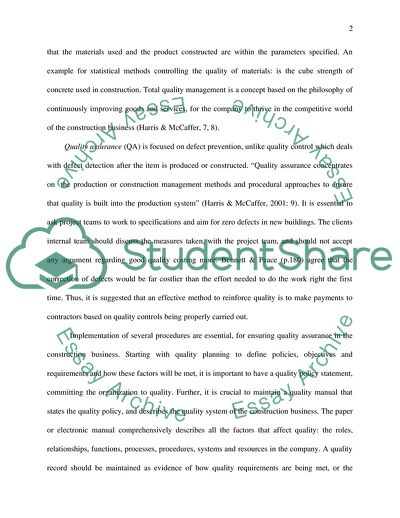
- Home
- Free Samples
- Premium Essays
- Editing Services
- Extra Tools
- Essay Writing Help
- About Us
- Studentshare
- Subjects
- Miscellaneous
- Construction Management
Construction Management - Essay Example

- Subject: Miscellaneous
- Type: Essay
- Level: Undergraduate
- Pages: 4 (1000 words)
- Downloads: 0
- Author: ggislason
Extract of sample "Construction Management"
Quality assurance includes the procedures which ensure that specifications are consistently met in each aspect of the construction process. The core principles of quality assurance are: “fit for purpose” and “right first time”. The International Quality Standard ISO 9000 family of standards is the frame of reference used as a benchmark for quality assurance; and its use is mandatory in today’s construction industry (Harris & McCaffer, 7). This paper proposes to illustrate and discuss the process of quality assurance in the construction industry; describe quality standards, requirements and systems; and demonstrate the application and benefits of quality assurance throughout the construction industry.
Quality refers to the fitness of the product to the customer’s requirements, that is quality is essentially meeting the requirement of the customer. Quality control deals with defect detection, which is done by inspection and statistical quality control techniques such as sampling, to ensure that the materials used and the product constructed are within the parameters specified. An example for statistical methods controlling the quality of materials: is the cube strength of concrete used in construction.
Total quality management is a concept based on the philosophy of continuously improving goods and services, for the company to thrive in the competitive world of the construction business (Harris & McCaffer, 7, 8). Quality assurance (QA) is focused on defect prevention, unlike quality control which deals with defect detection after the item is produced or constructed. “Quality assurance concentrates on the production or construction management methods and procedural approaches to ensure that quality is built into the production system” (Harris & McCaffer, 2001: 9).
It is essential to ask project teams to work to specifications and aim for zero defects in new buildings. The clients internal team should
...Download file to see next pages Read MoreCHECK THESE SAMPLES OF Construction Management
BIM and Construction management
Construction Management & Organisation
Construction Management Issues
Introduction to Construction Management
Applied Construction Management
Construction Management & Economics: Lean Construction
The Construction Management
Construction Management - Caledonian

- TERMS & CONDITIONS
- PRIVACY POLICY
- COOKIES POLICY